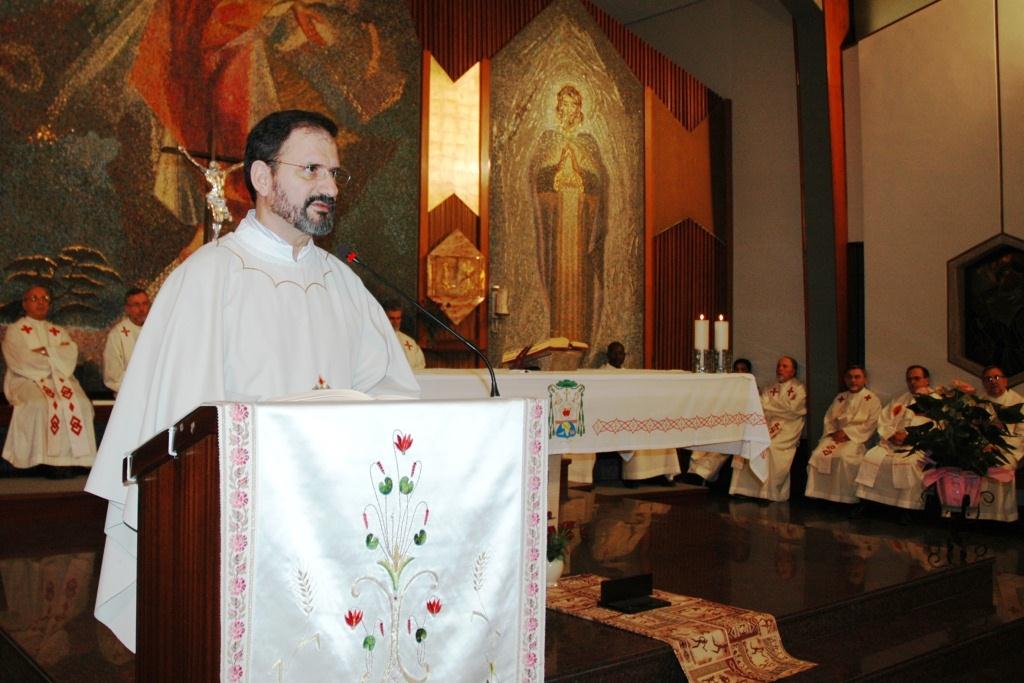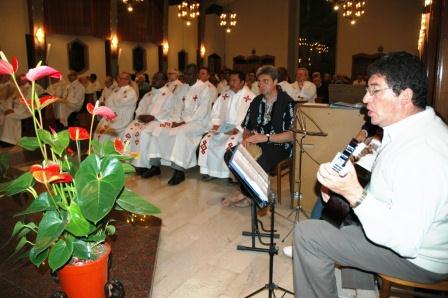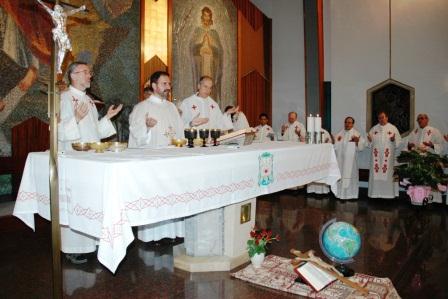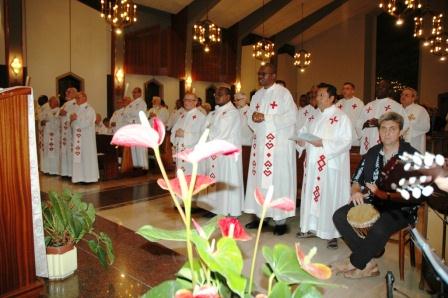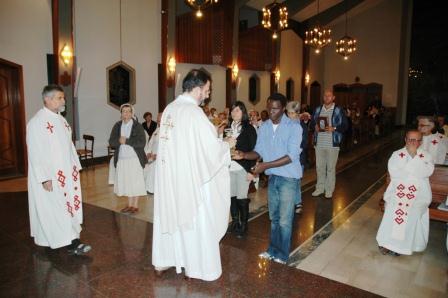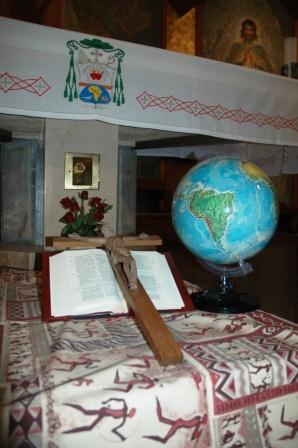Daniel Comboni
Comboni Missionaries
Institutional area
Other links
Newsletter
Rome, Tuesday, October 11, 2011
Yesterday, about 60 Comboni Missionaries living in Rome – among them the members of the community of St. Pancrazio, the Curia, the confreres attending the Comboni Year of Ongoing Formation – some Comboni Sisters and lay friends celebrated together the solemnity of St. Daniel Comboni, at four different times of the day: Lauds, Eucharistic adoration, Mass and dinner.
¨We celebrate the feast of Comboni at the beginning of the new school and pastoral year. Comboni affords us the opportunity of a good start. Comboni invites us to start anew in order to draw us nearer to the Heart of Christ and to our Nigrizia,” said Fr. Manuel Joao Pereira Correia at morning Lauds. His reflection highlighted two possible postures of the missionary approach to God: drawing closer or drawing farther away.
“A few days ago, the liturgy gave us the figure of the prophet Jonas, a living example of a wrong start. Invited by God to move, he begins a journey but in order to run away from God and from Nineveh, his mission land. His attitude is a missionary spirituality of running away! He runs from Nineveh because there live the pagans and the enemies – who must be kept away – and he runs from God because he does not share His attitude of compassion and sympathy towards Nineveh. Rescued by the whale of obedience, his message remains typical of someone who does not want to be involved in the message of his own preaching and, as soon as possible, he again keeps his distance from God and from the people of Nineveh. He leaves the city to assume the posture of a spectator. Jonas is the negative mirror image of our many false starts of running away from God and from mission, a way to live mission with a detached heart,” continued Fr. Manuel João.
“Today, - continued Fr. Manuel João – the feast of Comboni offers us instead an example of a good start that draws us closer to God and to mission. Comboni is the positive mirror image of our missionary ideal. Convinced that he is being sent to the Nigrizia, he struggles to overcome all the obstacles to his departure (SS 13, 15) and to remain faithful: ‘Even if the Pope, Propaganda and all the bishops of the world were to be against me, I would bow low for a year, and then I would present a new plan: but to stop thinking of Africa, never, never.’ (SS 1071). His is a missionary spirituality of closeness. His station will always be at the foot of the Cross in order to have a better view from that privileged spot. Because ‘the works of God are born, grow and prosper at the foot of the cross’, a theme that in his writings appears around 15 times. Forced by obedience to move away, he leaves his heart in Africa (SS 3156). In reality he never leaves his people – “my thoughts and my steps were always for you’ (SS 3157) and when he eventually returns it is ‘in order to never cease to belong to them’ (SS 3158) and to make ‘common cause, ready to die with them’ (SS 3159)”
The Eucharistic adoration was led by the secretary general of formation, Frt. John Baptist Keraryo Opargiw, who delivered a short reflection on the catholicity of mission as Comboni himself envisioned it (see the complete text in the attachment). In fact, Comboni wrote that “this Work must be Catholic, not Spanish or French or German or Italian” (SS 944). In connection with this statement, Fr. John Baptist quoted a comment by Bishop Giuseppe Franzelli: “Against any form of nationalism, especially strong in his time, Comboni expected his work to be ‘Catholic, not simply Spanish or French, or German or Italian.’ It is a vision and an attitude totally up to date in today’s global village, which as a paradox, sees the growth at the same time of a need for affirmation and identity of individual countries, cultures and continents, at the risk of creating new closures and conflicts. We need a universal atmosphere, the opening of larger horizons, rather than exclude or even demonize other points of view.”
In the course of the Eucharist, the superior General, Fr. Enrique Sánchez González, underlined the main points of his message “St. Daniel Comboni – Holiness at the foot of the Cross” sent to all the confreres a few days before the feast. Fr. Enrique drew a comparison between the crosses that Comboni had to bear and the crosses that today he – as superior and leader of the Institute – and each Comboni Missionary carry on their shoulders and brought into focus the very close connection that exists between “sanctity and the cross, between acknowledging the presence of God in the life and activity of the missionary and Calvary as the path that leads to the cross.” According to Fr. Enrique, the missionary must find specifically in the crosses “the fruitful places where God is present, places where true sanctity is revealed, which belongs to God, the sanctity which makes us enter into the mystery of salvation offered to all of humankind in the crucified Christ.” And this is so, emphasizes the superior general, because “the cross is the place where God shows himself, without hiding in any way his divinity.” For this reason “the crosses are the schools of holiness” and “the journey of humanity towards holiness.”
Fr. Enrique concluded his reflection with a positive and hopeful thought: “Crosses do not frighten us and, just as in the case of St. Daniel Comboni, we too can live the experience of turning the crosses of this world, of the Institute and our own into an occasion to live a deeper encounter with the Lord, to discover together with him that he continues to be the word of life and that only starting from Him, even our crosses can become occasions of holiness.”
The day ended with a common supper together with all the communities of Rome, including San Pancrazio, some Comboni Sisters and lay friends.

